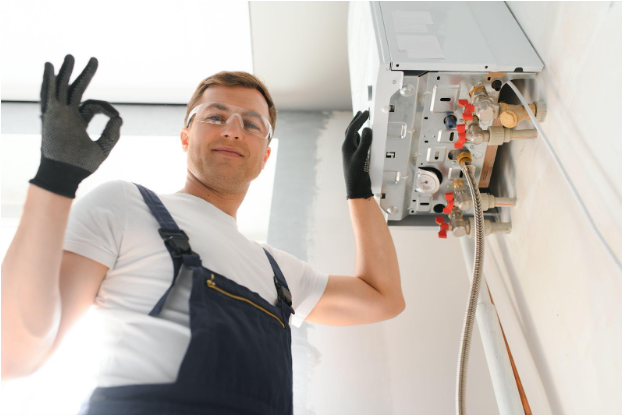Gas safety in residential areas is most important, given the essential role that gas plays in our daily activities. From cooking and heating to running various household appliances, gas usage is prevalent. However, it is also accompanied by several risks, including gas leaks, explosions, and carbon monoxide poisoning. Implementing preventive measures is not just about compliance with regulations but also about ensuring the health and safety of your household.
This article will shed light on vital preventive practices you can adopt to ensure gas safety in your home. It covers regular maintenance and inspections, installing and maintaining gas detectors, safe usage of gas appliances, emergency preparedness, and upgrading and modernising gas systems.
Regular Maintenance and Inspections
Annual professional inspections are essential for ensuring gas safety.. Trained technicians can identify potential hazards that are not visible to the untrained eye. During a professional inspection, all gas lines and connections should be examined thoroughly. Ensuring ventilation systems are unobstructed and working efficiently is crucial, as proper ventilation can avert many dangers associated with gas usage.
Homeowners can also conduct several DIY checks regularly. For instance, checking if gas connections are secure, looking for signs of wear and tear on hoses, and ensuring gas appliances are turned off when not in use are simple yet effective practices. One should also learn to recognise signs of a gas leak, such as a sulphur-like or rotten egg smell, hissing noises near gas lines, or dead vegetation around gas pipes.
Choosing the right professional for inspections can be daunting. It’s advisable to go for a licensed gas fitter with good reviews and a solid reputation. Referrals from friends or family members can also help in making a reliable choice.
Installing and Maintaining Gas Detectors
Gas detectors are indispensable for ensuring safety. Various types of gas detectors, such as carbon monoxide detectors and natural gas detectors, serve different purposes. While carbon monoxide detectors are essential for detecting dangerous levels of carbon monoxide gas, natural gas detectors can alert you to potential leaks from appliances and pipelines.
Proper placement of gas detectors is essential for their effectiveness. They should be installed in key areas, including near gas appliances, in kitchens, and bedrooms. Ensuring that detectors are placed at the correct height — around knee level for natural gas and at eye level for carbon monoxide detectors — can also enhance their efficacy.
Maintaining and testing gas detectors is straightforward but crucial. Regularly checking the batteries, dusting off the units to prevent obstruction, and testing the alarm functions monthly can ensure they remain functional. Knowing what to do when a gas detector alarm goes off is vital. Immediate evacuation and contacting emergency services should be your first steps.
Safe Usage of Gas Appliances
Gas appliances, including stoves, heaters, and ovens, must be used responsibly to ensure safety. Always follow the manufacturer’s guidelines when operating any gas appliance. Ensuring adequate ventilation is equally important. Ventilating your home properly can prevent the buildup of harmful gases and maintain indoor air quality.
There are several do’s and don’ts for gas appliance safety. Do regularly check appliances for maintenance needs, keep flammable materials away from gas sources, and ensure a clear space around your appliances. Don’t ignore a burning smell, attempt DIY repairs on gas lines, or use gas appliances for non-indicated purposes (like heating your home with a gas stove).
Recognising signs of malfunctioning appliances can also prevent accidents. Strange noises, soot build-up, excessive condensation on windows, or any inexplicable variations in flames’ colour can indicate issues. Calling a professional at the first sign of trouble is always wise to pre-empt any potential hazards.
Emergency Preparedness and Response
Knowing what to do in case of a gas leak can save lives. If you suspect a gas leak, avoid using electrical switches, mobile phones, or any other potential sources of ignition. Open windows and doors to ventilate the area immediately, evacuate the house, and contact emergency services from a safe location.
Creating a gas emergency plan for your household is a proactive measure. Make sure all family members understand the plan, know how to shut off the gas supply, and are familiar with emergency exits. Regular drills can also reinforce these protocols, ensuring that everyone remains calm and composed in an emergency.
Educating family members about gas safety should not be overlooked. Show your children how to recognise the smell of gas and other signs of a leak. Stress the importance of not tampering with gas appliances and always reporting any concerns to an adult or a professional.
Having key contact numbers at hand, such as those of your gas provider, emergency services, and a trusted gas fitter, can further expedite response times and minimise risks.
Upgrading and Modernising Gas Systems
Upgrading old gas systems can deliver numerous benefits, including enhanced safety and efficiency. Modern gas systems often come with built-in safety features, such as automatic shut-off valves and advanced leak detection technologies. These innovations can provide peace of mind, knowing that your home is equipped with the latest gas safety measures.
The initial costs of modernisation may be significant but can lead to long-term savings through improved energy efficiency and reduced risk of expensive repairs. Additionally, some upgrades might qualify for government rebates or incentives, further offsetting the investment.
When choosing the right upgrades, consider both your current needs and future plans. Consulting with a qualified professional can provide insights into the most beneficial and cost-effective options for your home.
Conclusion
Ensuring gas safety in your home requires a combination of regular maintenance, proper usage of appliances, emergency preparedness, and staying updated with modern safety technologies. By implementing these essential preventive measures, homeowners can protect their families and properties from the risks associated with gas usage.
Taking proactive steps today can yield long-term benefits. Always prioritise safety, conduct regular checks, and never hesitate to call in professionals for inspections and repairs. These preventive measures are invaluable in maintaining a safe and secure home environment.
